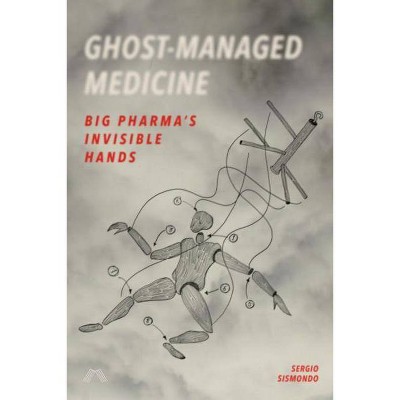Ghost-Managed Medicine - by Sergio Sismondo (Paperback)

Similar Products
Products of same category from the store
AllProduct info
<p/><br></br><p><b> About the Book </b></p></br></br>Ghost-Managed Medicine probes the pharmaceutical industry and its agents as they work to shape medicine and createmarkets for drugs. The book traces paths of information about drugs, from the extraction of data from experimental bodies to articles ghostwritten for researchers to manifold infl uences of doctors and consumers.<p/><br></br><p><b> Book Synopsis </b></p></br></br><p>Ghost-Managed Medicine by Sergio Sismondo explores a spectral side of medical knowledge, based in pharmaceutical industry tactics and practices.</p><p>Hidden from the public view, the many invisible hands of the pharmaceutical industry and its agents channel<em> </em>streams of drug information and knowledge from contract research organizations (that extract data from experimental bodies) to publication planners (who produce ghostwritten medical journal articles) to key opinion leaders (who are sent out to educate physicians about drugs) to patient advocacy organizations (who ventriloquize views on diseases, treatments and regulations), and onward. The goal of this 'assemblage marketing' is to establish conditions that make specific diagnoses, prescriptions and purchases as obvious and frequent as possible. While staying in the shadows, companies create powerful markets in which increasing numbers of people become sick and the drugs largely sell themselves.</p><p>Most agents for drug companies aim to tell the truth, but the truths they tell are drawn from streams of knowledge that have been fed, channeled and maintained by the companies at every possible opportunity. Especially because those companies have concentrated influence and narrow interests, consumers and others should be concerned about how epistemic power is distributed - or 'political economies of knowledge' - and not just about truth and falsity of medical knowledge.</p><p>In pharmaceutical companies' ideal worlds, medical research, education and marketing would be tightly fused. Doctors trying to educate themselves would turn to companies' agents, such as researchers and educators sponsored to spread particular messages, local sales reps hired to change doctors' behaviour, or journalists supplied with news stories. Ghost-Managed Medicine shows that the real world of medicine is not very far from the worlds that the companies want to create. Big Pharma's many invisible hands are busy throughout medicine, and medicine changes as a result.</p><p>Ghost-Managed Medicine draws on presentations at industry conferences, especially ones where pharmaceutical companies interact with communication, marketing and other agencies. Participants at these interface conferences describe goals, practices and concerns; in the process, they reveal a lot about how the industry works. Some of the book's other data is taken from publications that also serve as interfaces between the industry and adjacent actors, and from interviews with people engaged in pharmaceutical marketing.</p>
Price History
Price Archive shows prices from various stores, lets you see history and find the cheapest. There is no actual sale on the website. For all support, inquiry and suggestion messagescommunication@pricearchive.us




















